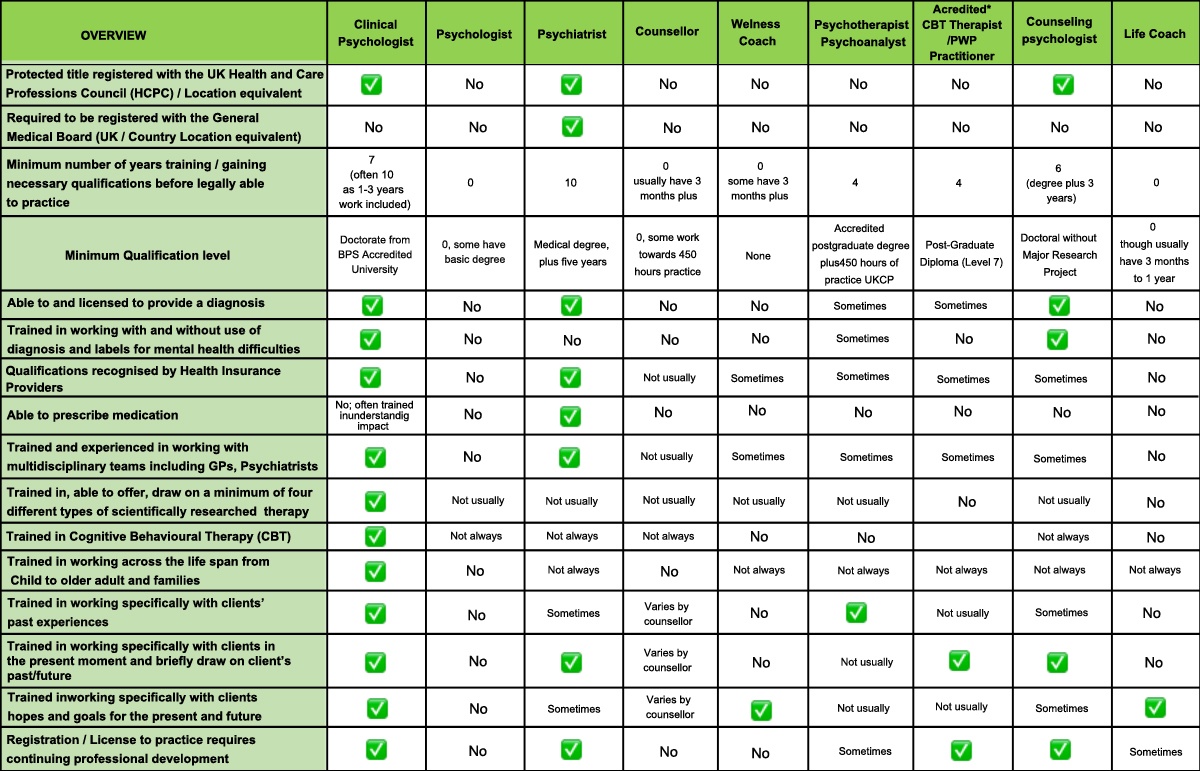Different types of Therapists Counsellors and Coaches
Do you know the difference between a psychologist and a psychiatrist? or the difference between a Counsellor, Psychotherapist or a Coach?
Please see the table and notes below for a comprehensive yet quick view of the key differences between the many types of mental health practitioners that commonly offer their services in the health industry today.

Notes for the table and below:
CBT – Cognitive Behavioural Therapy
BABCP - British Association for Behavioural & Cognitive Psychotherapies
BACP - British Association for Counselling and Psychotherapy
BPS – British Psychological Society
COSRT - College of Sexual and Relationship Therapists
HCPC – Health and Care Professions Council
PWP - Psychological Wellbeing Practitioner
UKCP - United Kingdom Council for Psychotherapy
The current UK Law
Unlike in the United States, currently there are no laws in the UK preventing anyone operating as a therapist, psychotherapist or a counsellor. Cheap online courses allow some people to cheat to complete them, meaning qualifications are often meaningless. Instead ComposurePsychology recommends you seek
someone who is registered with a regulatory body such as the HCPC and / or completed recognised accredited courses through the British Psychological Society, BACP, BABCP, COSRT or UKCP.
Training
Not all Counsellors or CBT therapists have trained with or been examined and accredited by an organisation that has met and maintained accreditation requirements. Accredited usually refers to training through the Universities that have met the strict accreditation standards of the British Psychological Society or training through BACP, BABCP, or the equivalent organisation in the country in which the therapist is located.
Beware
Beware of people claiming to be psychologists or CBT Therapists but who do not have a minimum level of recognised training or do not have any clinical experience. Many people set themselves up as psychologists offering clinical therapy after having completed a psychology or Masters degree; this is unlikely to have involved any clinical work or supervision. Many people call themselves CBT Therapists after completing a workshop or short course of three weekends in CBT that has not involved any examination, exposure to or supervision of clinical work.
Adherence to ethical and professional standards
While some unqualified therapists are likely to be good at the service they offer, there are likely to be many more that are working outside their qualification and competency level. These therapists are not required to adhere to regulatory medical, mental health and therapeutic standards of care in the same way psychologists, psychiatrists and other fully qualified and well trained therapists are required to do.
Your rights
You are well within your rights to ask a therapist what training, qualifications and experience they have and a good therapist will welcome and be open to your questions.
Risk of Harm
You may be at risk of harm if you decide to seek counselling or therapy from a mental health practitioner who is not fully qualified and registered with the HCPC or a suitably accredited body as mentioned above.
